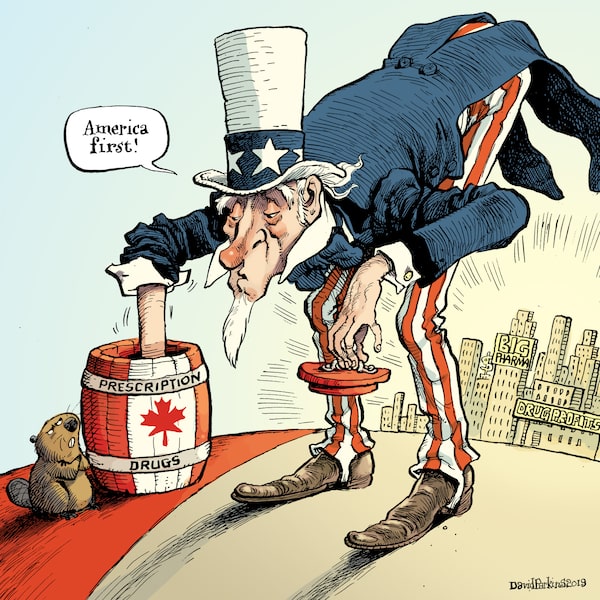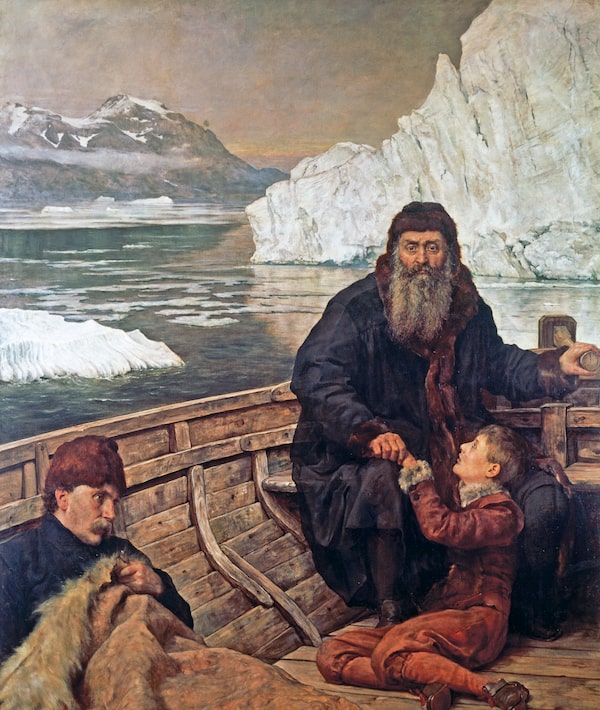Good morning,
These are the top stories:
Aggressive wildfires in the Arctic are being fuelled by climate change, experts say
Blazes in Alaska and Siberia are lasting longer, reaching deeper and burning at higher latitudes than in previous years – prompting concerns about how vulnerable the Far North is to a warming climate.
Fires inside the Arctic Circle in June emitted more carbon dioxide than the previous eight Junes combined, according to European Union estimates. The impact from methane emissions is unclear, since scientists don’t know how much is being released from thawing permafrost.
“More fire means more greenhouse gases, means more warming, which then means even more fire,” said Mike Flannigan, a professor at the University of Alberta and director of the Western Partnership for Wildland Fire Science.
This is the daily Morning Update newsletter. If you’re reading this on the web, or it was forwarded to you from someone else, you can sign up for Morning Update and more than 20 more Globe newsletters on our newsletter signup page.
The OSC is investigating CannTrust
The probe will be conducted by a team that includes the Ontario Securities Commission, the RCMP’s Financial Crime Program and the Ontario Provincial Police Anti-Rackets Branch.
This is just the latest turmoil for CannTrust, which fired its CEO and forced the dismissal of its chairman last week after The Globe and Mail revealed the executives were informed of unlicensed cannabis growing seven months before Health Canada uncovered the breach. CannTrust has since appointed a special committee of its board to probe the unlicensed growing.
The company could face sanctions from both U.S. and Canadian securities regulators as well as possible repercussions from Health Canada. Meanwhile, several law firms are seeking plaintiffs for class-action lawsuits against CannTrust on behalf of shareholders.
Bombardier has asked EDC to select an investigator to review its overseas practices
The move by the Canadian plane and train maker comes in the wake of allegations that company officials used corruption and collusion to win a rail contract in Azerbaijan.
Bombardier plans to work with an independent organization chosen by Crown agency Export Development Canada “to evaluate our existing due diligence processes.”
In May, The Globe revealed that a World Bank audit alleged Bombardier colluded with Azerbaijan Railways senior officials as early as three years before it was awarded a contract worth US$339-million.
That Azerbaijan deal was 85 per cent financed by the World Bank; the audit could lead to Bombardier being blacklisted from projects funded by the international financial institution.
Energy executives are listed as organizers for a recent Conservative Party event
Documents filed with Elections Canada also show the June 4 fundraising event in Calgary, which featured Andrew Scheer, included key oil-industry players who were involved in a secret April meeting with the Conservative Leader. At the time, those executives said the April meeting was non-partisan.
The disclosure comes as Canada’s oil patch seeks to play a bigger role advocating for itself ahead of the federal election. The presidents of three energy companies took out ads in 30 Canadian newspapers yesterday to push for political leaders to support “an innovative energy industry.”
Our editorial board argues that a vibrant energy sector is good for the country: “As long as the world uses oil, Canada should continue to produce it, even as we bring in policies to discourage its use, or make it cleaner. It’s a tricky balance.”
Got a news tip that you’d like us to look into? E-mail us at tips@globeandmail.com Need to share documents securely? Reach out via SecureDrop
ALSO ON OUR RADAR
U.S. ramps up trade war with China: Donald Trump has announced that his administration will impose a 10-per-cent tariff on another US$300-billion in Chinese goods starting Sept. 1, blaming the move on Beijing not buying more U.S. agricultural products as well as failing to halt the flow of fentanyl into the U.S.
Protesters killed in Sudan: Tensions between the military and pro-democracy advocates show no signs of abating despite some progress in talks to form a new government. The deaths yesterday came days after a number of child protesters were killed by a government security force.
Ontario GO stations could get corporate names: Sponsorship rights usually reserved for sports venues may soon be made available for five train stations in the Greater Toronto Area. A new proposal from the Ford government could also see parking lots and bathrooms adorned with company names.
Study examines Canadians’ tax bill: A new report from the Fraser Institute says the average Canadian household spent more in taxes than on living costs in 2018. The $39,299 average tax burden is nearly three times what Canadians paid in 1961 after adjusting for inflation, though programs like medicare and the Canada Pension Plan didn’t exist at that time.
MORNING MARKETS
Global stocks took a beating on Friday, with investors piling into safe-haven assets but oil prices recouped some losses after U.S. President Donald Trump said he would slap a 10 per cent tariff on the remaining US$300-billion of Chinese imports starting September 1.
Pan-European Euro Stoxx 50 futures shed 2.0 per cent in late Asian trade, indicating that European cash share markets will open sharply lower on Friday, while U.S. stock futures extended losses, dropping 0.2 per cent, following the S&P 500 skidding 0.9 per cent to hit one-month lows overnight.
At about 6:30 a.m. ET, Tokyo’s Nikkei was down 2.11 per cent, Hong Kong’s Hang Seng down 2.35 per cent and the Shanghai Composite down 1.41 per cent. In Europe, London’s FTSE 100 was 1.75 per cent and the Paris CAC was down 2.67 per cent. Germany’s DAX was 2.49 per cent lower. New York futures were down. The Canadian dollar was at 75.65 U.S. cents.
WHAT EVERYONE’S TALKING ABOUT
Why am I so skeptical of female candidates?
Johanna Schneller: “Time for soul-searching. During the recent U.S. Democratic Party presidential debates, I’ve been harder on the five credible female candidates (sorry, not sorry, Marianne Williamson) than on their male competitors. I worry that Kamala Harris frowns too much. I wince when Elizabeth Warren looks awkward. … All this, even though I desperately want a female U.S. president, and fear I won’t see one in my lifetime.”
Toronto flooded. What else is new?
Glenn McGillivray: “The challenge facing Toronto and, indeed, a long list of other cities in the country, on the storm water and flooding issue is huge. And it will only get bigger as our urban areas join many of their international counterparts in the move toward more compact cities where roofs, asphalt and cement overtake trees, wetlands and grass.” Glenn McGillivray is the managing director at the Institute for Catastrophic Loss Reduction
How digital growth is driving regional inequality
Beata Caranci: “What if high-skilled jobs and their employers become concentrated within a handful of cities, driving up the cost of living and pushing out people and firms at the lower end of the skills spectrum? The rich cities get richer, and the poor cities get poorer; and firms’ location decisions become a defining factor to inequality.” Beata Caranci is chief economist at TD Bank Group.
TODAY’S EDITORIAL CARTOON

(David Parkins/The Globe and Mail)David Parkins/The Globe and Mail
LIVING BETTER
What’s in theatres this weekend
The documentary David Crosby: Remember My Name, writes Brad Wheeler, showcases the persona of the stunningly self-aware and relentlessly candid sixties rock star. (3.5 stars)
Barry Hertz says Hobbs & Shaw, the latest in the Fast & Furious cannon, is two outrageous hours of planes, Dwaynes and automobiles – which isn’t a complaint. (3 stars)
While the film is called Tel Aviv on Fire, Wheeler says nothing is inflamed in this good-humoured farce on the Israeli-Palestinian conflict. (3 stars)
MOMENT IN TIME
Henry Hudson sails into namesake bay

The last voyage of Henry Hudson, an 1881 painting by John Collier. (DeAgostini/Getty Images)DeAgostini / Getty Images
Aug. 2, 1610: Henry Hudson was on his fourth voyage of exploration when his ship, Discovery, first sailed into the vast inland sea that now bears his name. On previous voyages – in 1607, 1608 and 1609 – the English navigator had joined a long roster of Europeans in the quest for a northern route through the Arctic to reach the fabled riches of Asia. During the last of those earlier ventures, Hudson sailed into Chesapeake Bay, Delaware Bay and up the great river that also now carries his name, in modern New York State. His final, ill-fated expedition left London in April, 1610, with Discovery making for the ice-packed waters of what is now Hudson Strait, between Baffin Island and northernmost Quebec. From there Hudson turned south and on this day in 1610 first saw Hudson Bay’s “spacious sea” – which he initially mistook for the Pacific. Discovery’s crew spent three months exploring it, then endured a hungry winter on James Bay. Spring came, but by June, 1611, morale reached the breaking point. A handful of officers and men mutinied; Hudson, his teenaged son and seven others were put into a small boat and set adrift. They were never seen again. – Christopher Harris
If you’d like to receive this newsletter by e-mail every weekday morning, go here to sign up. If you have any feedback, send us a note.